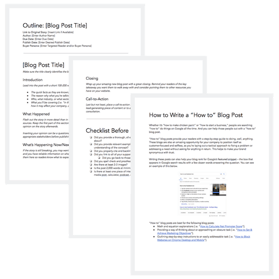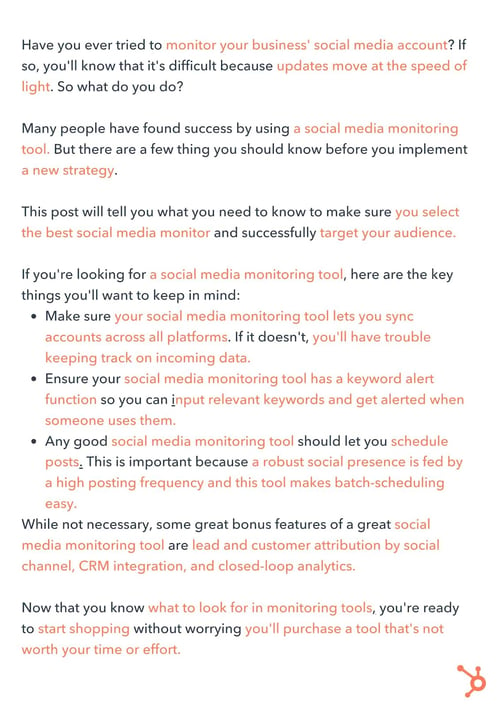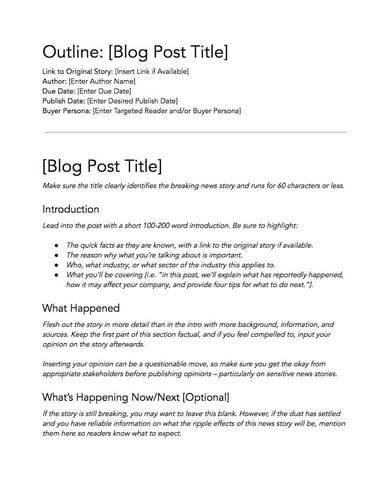Blogging has always been an effective content marketing strategy. However, sometimes, it can be difficult to put pen to paper – or more accurately, words to the screen.
That’s where blog post templates can come in handy.
In this post, we’ll equip you with a blogging template to use in Google Docs that follows a standard writing formula to capture your audience’s attention.
Why Use Google Docs for Blog Post Templates
The number one reason to use Google Docs for your blog post templates is the collaboration features.
The platform allows you to:
- Share templates.
- Manage editing permissions.
- Request feedback on your content.
- Download and convert into other file formats.
- Back documents up the cloud.
Google Docs also allows you to easily copy documents. This means that once you create your template, anyone on your team can copy it and save it in their own folder.
Beyond the collaboration features, you can also work on your document offline – so if you are working in an area with no Wi-Fi, you can still get your work done.
Another helpful tool is the version history and recovery. Say you start writing one night and take out a whole paragraph. Then, the next day, you reconsider and decide you want to add it back in.
By accessing your version history, you can retrieve that paragraph and either copy it into the new version or restore the old one.
Additionally, if there are multiple users, you can see who made what changes. This makes it easy to know who to reach out to in case you have additional questions.
Google Docs Blog Post Template
A comprehensive, high-quality blog post doesn’t have to be long.
In fact, shorter is often sweeter for your readers who have limited time to devote to reading the massive amounts of content on the web.
But well-written blog posts should include three sections, which you may be familiar with if you close your eyes and think back to elementary school writing classes: the introduction, the body, and the conclusion. Here’s what’s included in each.
Have you ever tried to ___________? If so, you’ll know that it’s difficult because ___________________________. So what do you do?
Many people have found success by using ___________________. But there are a few things you should know before you implement ___________.
This post will tell you what you need to know to make sure ____________________ and successfully ________________.
If you’re looking for a _____________, here are the key things you’ll want to keep in mind:
- Make sure your ____________ lets you _______________. If it doesn’t, you’ll have trouble ___________.
- Ensure your ___________ has a ____________ so you can ____________.
- Any good ______________ should let you _____________. This is important because _________________.
While not necessary, some great bonus features of a great _____________ are __________, ____________, and _______________.
Now that you know ________________, you’re ready to __________________ without worrying _______________.

Download 6 Free Blog Post Templates Now
Introduction
The introduction sets the stage for the problem you’re about to solve.
You’re not providing specific solutions in this section, just why it’s worth resolving. Here, you want to be relatable, getting your readers to nod in agreement.
An introduction like that could apply to any problem, product with a few language tweaks.
Note: While your blog will sometimes promote your own product or service, it shouldn’t exist solely for that reason. First and foremost, the content on your blog should help your readers solve a common problem.
Do you see why that structure works for an introduction? First, it presents a problem (“Have you ever tried to,” and “it’s difficult because”).
Secondly, it sets up what the post will be about (the solution “people have found success.”)
Lastly, it explains why it’s important you know those things (“to ensure,” and “that will let you successfully.”)
Body
The body explains the solutions to the problem you set up in the introduction.
Now that you’ve identified a problem for your reader, they’re ready to hear your proposed solution.
Your body can be written in paragraphs, with bullets, numbered lists, multiple headings, or a mix. Make use of whichever format is easiest for you.
Each section explains what your product (or, again, service with very minor language tweaks) should have to help the reader meet the goals outlined in your introduction. Then, it reiterates why that’s important.
Conclusion
The conclusion wraps up your post with a brief statement that’s reflective of the problem your post solved.
You can also use the conclusion to prompt your readers to engage in further conversation in the comments.
The conclusion should be kept short, however, to ensure readers don’t abandon your blog post before realizing there’s acall-to-action to covert on.
Filling in the Google Docs Blog Post Template
Alright, you’ve seen the template. Let’s fill in the blanks, shall we?

I wrote aboutsocial media monitoring tools because it’s something I know about; and as a result, I was able to write this “sample” blog post really quickly.
You’ll experience that, too, when you write about something you know inside and out! You just needed a little push – or a template to get you started.
Free Google Docs Blog Post Templates
Want other templates that can apply to various types of blog posts? We’ve got you covered. This download includes templates for creating:
- A how-to post
- A list-based post
- A what-is post
- A newsjacking post
- An infographic post

Download 6 Free Blog Post Templates Now
Writing a Blog Post Template
The template content I’ve provided here is not intended to be copied and pasted into every blog post you write – that results in duplicate content for which you’ll be seriously punished in the SERPs.
It’s simply meant to show the structure you can follow to write a blog post because there really is a formula to it that makes it easy to write content that’s helpful for readers, and relatively quick and painless for you.
Feel free to swap in synonyms for words and phrases you see in the template, as long as it’s all original language.
It’s also important to note that this blog post gives you a template to help you start writing but there are other components of a successful blog post that you shouldn’t ignore.
I hinted at it above, but what would a blog post be without a call-to-action? It certainly wouldn’t help you drive any leads, that’s for sure. And to generate more click-throughs, you should spend some time crafting an excellent blog title.
You also need to think about optimization – did you include important keywords and internal links to other pages on your website?
Finally, remember that there are other structures for blog content that work, too. We don’t follow the same structure for every blog post we write, and we’ve seen structures other blogs use that work really well for them.
So go forth! Explore. Experiment. Get creative.
The goal isn’t that you follow this rigid template, it’s that you consistently create content that helps your reader. If you’re facing writer’s block, this template should help you out of that rut.






